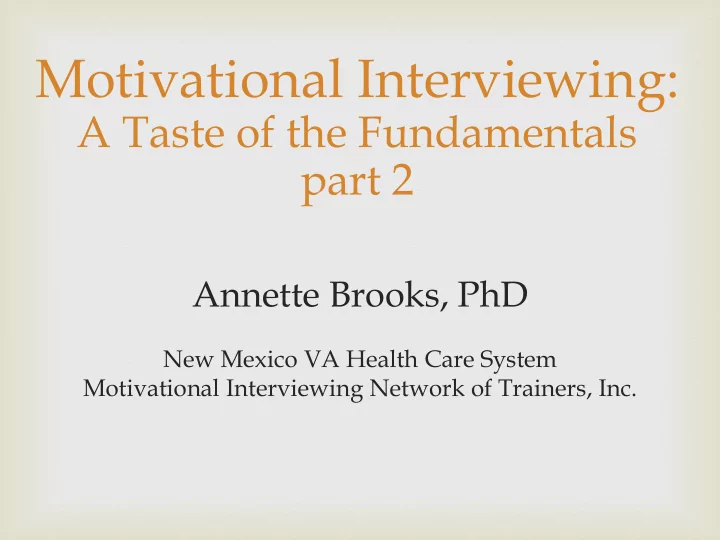

Motivational Interviewing: A Taste of the Fundamentals part 2 Annette Brooks, PhD New Mexico VA Health Care System Motivational Interviewing Network of Trainers, Inc.
objectives Part 1 – March 31, 2014 To introduce participants to the basics concepts of motivational interviewing. Part 2 – April 7, 2014 To introduce participants to MI-consistent micro- tools often used in working with patients.
Partnership MI Spirit Acceptance Compassion Evocation
Core Skills OARS Open-ended questions Affirmation Reflection Summary
sustain talk change talk Two sides of the same coin 5
Recognizing Change Talk D esire A bility R easons N eed C ommitment Activating T aking steps
Video Review
Micro-Tools Evoking Change Talk Exchanging Information
Evoking Change talk: Rulers “On a scale of 0-10, how important is it to you to exercise?” 0--1--2--3--4--5--6--7--8--9--10 Extremely Not at all important important “Why is it [x] and not 0 [a lower number]?” Reflect/Elaborate
Adapted Rulers It is not You are It is It is important to unsure about important to extremely make a making a make important to change change changes make changes You haven’t A seed is in Your plant Your plant is prepared the the soil but just broke ready to be ground for hasn’t been through the harvested planting watered soil [pointing] “Why is it here and not earlier in the sequence?” Reflect/Elaborate Thanks to Kamilla Venner, PhD for this ruler adaptation
Quiz Rulers
Exchanging Information Unsolicited advice is the junk mail of life. -Bern Williams Advice is what we ask for when we already know the answer but wish we didn’t. -Erica Jong The purpose is not to deliver the advice, but rather to foster change. -Miller & Rollnick
A Simple Strategy Reflect Reflect Evoke Provide Evoke Ask Permission
Example C: “What do you know about reducing alcohol?” (Evoke understanding) P: “I know it would be good if I could.” C: “Yeah, I bet. And my guess is that you’ve tried some things already.” P: “…like telling myself to just cut back.” C: “And that didn’t work so well.” P = Patient P: “Nope.” C = Clinician
Example (cont.) C: “I wonder if you would be interested in some ideas that other veterans have found helpful?” (Ask permission) P: “That’s why I am here.” C: “One approach is a structured, outpatient program like we have here at the VA. It provides a venue for exploring ways of cutting down, even stopping if that is what people decide, in a group setting that permits support and sharing of ideas. (Provide) What do you think of that?” (Evoke understanding)
Quiz (slide 16) E-P-E
Video Review 2
Learning More About MI Miller, W. R., & Rollnick, S. Motivational interviewing: Helping people change (3 rd ed.) (2013). New York: Guilford Press. Rollnick, S., Miller, W. R., & Butler, C. C. Motivational interviewing in health care (2008). Guilford Press. Rosengren, D. B. Building Motivational Interviewing Skills: A Practitioner Workbook (2009). New York: Guilford Press. www.motivationalinterviewing.org
Recommend
More recommend